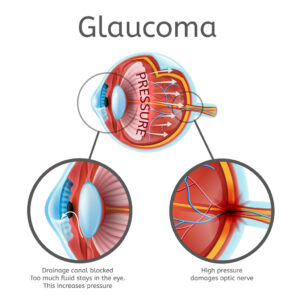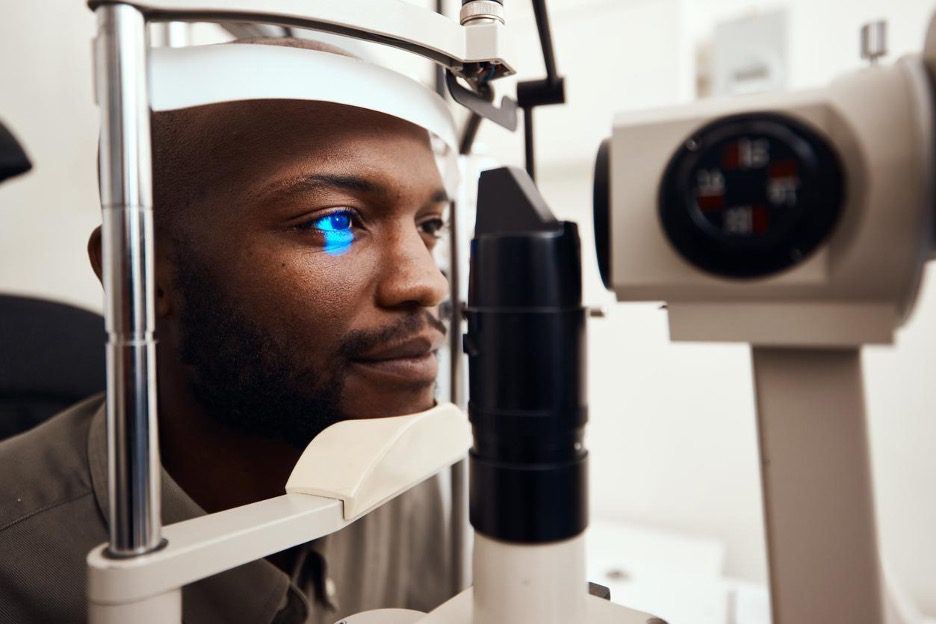As one of the more serious eye diseases, Glaucoma is among the leading causes of blindness. It’s a condition caused by increased pressure in the eye that ends up damaging the optic nerve. Since there isn’t any pain associated with glaucoma, many don’t realize they have it until the later stages of the disease. Can this often debilitating illness be reversed? The answer is complicated.
Can Glaucoma Damage Be Reversed?
There is currently no way to undo the damage that has already been done in terms of vision loss.
Reversing the Underlying Cause of Glaucoma
Even though it’s not possible to reverse the damage done by glaucoma, it is possible to reverse the underlying cause that leads to the condition, which is eye pressure. To do so, there can be different methods to try depending on the severity. Getting the pressure back down to a normal level will help preserve any vision that your eye still has.
Eye Drops
Treatment usually starts with eye drops. The drops help to limit the amount of fluid the eye makes and open up passageways for the fluid to drain better. In both cases, less liquid in the eye typically means less pressure. Some eye drops and medication can cause side effects so it’s important to talk to your eye doctor if you are experiencing problems. Sometimes in addition to eye drops, you may be prescribed oral medication.
Surgery
If eye drops don’t seem to be working for a particular case, then your eye doctor may recommend surgery to reduce eye pressure. Sometimes your eye doctor may choose laser surgery before suggesting eye drops. A common procedure called filtering surgery, or a trabeculectomy, occurs when a new pathway for fluid to drain is made within the eye. There can also be a microscopic tube placed in the eye to help fluid drain easier. Minimally invasive glaucoma surgery may be used to lower eye pressure. These types of procedures are less risky than some of the other options and may be combined with cataract surgery. There are different types of techniques available. Your eye doctor will discuss which ones are appropriate for your case.
After treatment, you will still need to see your eye doctor regularly for follow-up exams. You may also need to undergo additional procedures or treatment options if there are changes that happen in the eye or if eye pressure starts to rise again.

Treatment for Acute Angle-Closure Glaucoma
There are different types of glaucoma. Acute angle-closure glaucoma is considered a medical emergency and, if you are diagnosed with this type of glaucoma, you will require immediate treatment to reduce eye pressure. Treatment for this type of glaucoma will usually be a laser or surgical procedure or medicine. A laser peripheral iridotomy may be used, where your eye doctor creates a small hole using a laser in the iris to allow fluid to drain through it. This helps open the drainage angle to relieve any eye pressure.
Home and Lifestyle Remedies for Glaucoma
There are some lifestyle changes and things that can be done at home to promote eye health and help you control your eye pressure.
Eating a healthy diet not only helps you maintain your overall health, but the intake of certain nutrients and vitamins contributes specifically to eye health. These include antioxidant vitamins, such as A, C, and E, copper, selenium, and zinc. It’s important to get regular exercise as this may reduce eye pressure. Talk to your healthcare provider about what exercises are most appropriate for you. Drinking large amounts of caffeine can also increase eye pressure so it’s important to limit your consumption. In addition to limiting caffeine, it’s important to sip all beverages carefully. Drinking too much liquid in a short time can temporarily increase eye pressure. It’s important to stick to the prescribed medications since this can help you get the best possible treatment. Always use your eye drops exactly as prescribed to prevent optic damage and vision loss from getting worse.
What About Alternative Medicine?
Some alternative medicine approaches may help improve overall health and glaucoma treatment. However, none are considered an effective glaucoma remedy so talk to your doctor about risks and possible benefits.
There are some herbal substances, such as bilberry extract, that have been known to be a glaucoma remedy. Further research still needs to be done, though, to determine its effectiveness. It’s important to note that herbal supplements should not be taken in place of any proven therapies or treatments.
Note that stress can trigger an attack of acute angle-closure glaucoma so it’s always healthy to find ways to cope with stress. Relaxation techniques such as meditation may help.
Research has shown that medical marijuana can lower eye pressure in those that have glaucoma but it’s only temporary with the effects lasting three to four hours. This means that other standard treatments are more effective. While it can temporarily help, the American Academy of Ophthalmologists doesn’t recommend it as an effective strategy for treating glaucoma.
Advances in Medicine for Reversing Glaucoma
Studies are always being done to help treat and reverse the effects of glaucoma. Scientists at Harvard Medicine School have done a study showing that it may be possible to reverse age-related vision loss as well as eye damage, similar to what is caused by glaucoma, by using epigenetic reprogramming in mice.
Researchers at Jules Stein Eye Institute are also attempting to reverse damage for some patients via a trabeculectomy procedure. Not only can this surgery slow the rate of vision loss from glaucoma, but it can also provide long-term improvement of vision.
Preventing Glaucoma
Since vision loss is permanent, research is needed to identify ways to prevent it. There is currently no accepted strategy to prevent glaucoma. The best defense against damage caused by glaucoma is regular and rigorous eye exams with your eye doctor.
Knowing your risk for glaucoma may also allow you to have open conversations with your eye doctor to see if you need additional exams. Anyone can get glaucoma, but some groups are more high risk. Those over the age of 60 are particularly vulnerable. People with diabetes are two times more likely to get glaucoma while African Americans are six to eight times more likely to develop the condition than other races.
Action to Prevent Vision Loss from Glaucoma
When a condition can’t be reversed, it’s important to take steps to prevent vision loss. If you are at a higher risk for developing glaucoma, it’s important to get a comprehensive dilated eye exam to catch the condition early and start treatment as soon as possible. The earlier you start treatment, the better your chances of stopping glaucoma from progressing. It’s important to listen to your eye care specialists about how often you should follow up with exams. Even if you aren’t in a high-risk group, you should still have a dilated comprehensive eye exam by age 40 to not only catch glaucoma early but other eye diseases as well. Since glaucoma is hereditary, talking to your family members about their vision can help you protect your own vision. Avoiding smoking, controlling blood pressure, and maintaining a healthy weight can help you avoid Type 2 diabetes and other chronic health conditions that may lead to glaucoma.
Contact Us at Florida Eye
Contact the Glaucoma Specialists at Florida Eye Specialists & Cataract Institute. With an eye condition that doesn’t have any symptoms, the best way to catch it early is to get regular eye exams. Whether or not you are in the high-risk category for glaucoma, it’s important to see your eye doctor. The specialists at Florida Eye are here to offer complete eye exams and explain treatment options for glaucoma to preserve the vision you have.



